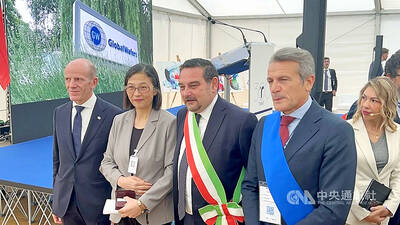Alchip Technologies Ltd (世芯), an application-specific integrated circuit (ASIC) designer specializing in server chips, expects revenue to decline this year due to sagging demand for 5-nanometer artificial intelligence (AI) chips from a North America-based major customer, a company executive said yesterday.
That would be the first contraction in revenue for Alchip as it has been enjoying strong revenue growth over the past few years, benefiting from cloud-service providers’ moves to reduce dependence on Nvidia Corp’s expensive AI chips by building their own AI accelerator by outsourcing chip design.
The 5-nanometer chip was supposed to be a new growth engine as the lifecycle of its 7-nanometer AI accelerator gradually comes to an end this year. However, their hopes were dashed as the company saw first-quarter revenue weakened, dipping 21 percent sequentially or 4.4 percent annually to US$318.74 million.

Photo: screen grab from Alchip Technologies’ Web site
“We expect revenue to remain subdued for the remaining three quarters,” Alchip chief financial officer Daniel Wang (王德善) said at an online earnings conference. “The demand for 5-nanometer AI accelerator appears to be weak, as the customer has rescheduled production several times.”
However, Alchip expects “significant revenue growth” from the new 3-nanometer chip, which is to start volume production early next year, Wang said.
On top of that, Alchip has secured multiple new design projects using 2-nanometer process technology, indicating robust growth momentum in the following years, Wang said.
“We are still positive about the AI market. As an industry leader, we will outgrow the AI market’s compound annual growth rate in the high-performance computing [HPC] segment from 2025 to 2027,” Alchip CEO Johnny Shen (沈翔霖) said.
A majority, or 95 percent, of Alchip’s revenue last quarter came from the HPC segment, from 92 percent in the fourth quarter last year.
Based on Alchip’s latest filing with the Taiwan Stock Exchange, revenue last month plunged 21.5 percent year-on-year and 12.95 percent from a month earlier to NT$3.15 billion (US$103.9 million).
Net profit last quarter plummeted 22 percent sequentially, but grew 13.9 percent year-on-year to US$44.42 million. Earnings per share dropped to NT$18.1 from NT$23 a quarter ago, but increased from NT$15.8 a year earlier.
Gross margin last quarter surged to 23.16 percent from 21.2 percent the previous quarter and 18.79 percent a year earlier, marking the highest in six quarters.
Alchip attributed it to higher revenue contribution from its non-recurring engineering (NRE) business. It expects the uptrend to continue through the rest of this year, as NRE revenue rises due to increasing complexity in chip designing and manufacturing, Wang said.

RECYCLE: Taiwan would aid manufacturers in refining rare earths from discarded appliances, which would fit the nation’s circular economy goals, minister Kung said Taiwan would work with the US and Japan on a proposed cooperation initiative in response to Beijing’s newly announced rare earth export curbs, Minister of Economic Affairs Kung Ming-hsin (龔明鑫) said yesterday. China last week announced new restrictions requiring companies to obtain export licenses if their products contain more than 0.1 percent of Chinese-origin rare earths by value. US Secretary of the Treasury Scott Bessent on Wednesday responded by saying that Beijing was “unreliable” in its rare earths exports, adding that the US would “neither be commanded, nor controlled” by China, several media outlets reported. Japanese Minister of Finance Katsunobu Kato yesterday also

‘DRAMATIC AND POSITIVE’: AI growth would be better than it previously forecast and would stay robust even if the Chinese market became inaccessible for customers, it said Taiwan Semiconductor Manufacturing Co (TSMC, 台積電) yesterday raised its full-year revenue growth outlook after posting record profit for last quarter, despite growing market concern about an artificial intelligence (AI) bubble. The company said it expects revenue to expand about 35 percent year-on-year, driven mainly by faster-than-expected demand for leading-edge chips for AI applications. The world’s biggest contract chipmaker in July projected that revenue this year would expand about 30 percent in US dollar terms. The company also slightly hiked its capital expenditure for this year to US$40 billion to US$42 billion, compared with US$38 billion to US$42 billion it set previously. “AI demand actually

Jensen Huang (黃仁勳), founder and CEO of US-based artificial intelligence chip designer Nvidia Corp and Taiwan Semiconductor Manufacturing Co (TSMC, 台積電) on Friday celebrated the first Nvidia Blackwell wafer produced on US soil. Huang visited TSMC’s advanced wafer fab in the US state of Arizona and joined the Taiwanese chipmaker’s executives to witness the efforts to “build the infrastructure that powers the world’s AI factories, right here in America,” Nvidia said in a statement. At the event, Huang joined Y.L. Wang (王英郎), vice president of operations at TSMC, in signing their names on the Blackwell wafer to

Taiwan-based GlobalWafers Co., the world’s third largest silicon wafer supplier, on Wednesday opened a 12-inch silicon wafer plant in Novara, northern Italy - the country’s most advanced silicon wafer facility to date. The new plant, coded “Fab300,” was launched by GlobalWafers’ Italian subsidiary MEMC Electronics Materials S.p.A at a ceremony attended by Taiwan’s representative to Italy Vincent Tsai (蔡允中), MEMC President Marco Sciamanna and Novara Mayor Alessandro Canelli. GlobalWafers Chairwoman Doris Hsu (徐秀蘭) said the investment marked a milestone in the company’s expansion in Europe, adding that the Novara plant will be powered entirely by renewable energy - a reflection of its